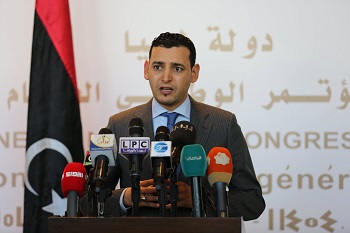By Ajnadin Mustafa.

Tripoli, 5 January 2015:
The government in Beida has denied that it was responsible for the website of Libya TV . . .[restrict]crashing. The station claimed that that website had been hacked and accused the Information Board of being behind it.
According to channel editor Alaa Farouk, the attack was one of many in recent months, including one in August in which its Tripoli studios were damaged and equipment stolen, allegedly by Libya Dawn forces. Libya TV is now broadcasting on the web through its website.
The accusation that the Information Board was involved in the latest attack has been strongly rebutted by the head of the Information, Culture and Antiquities Board, Omar Gawairi. He told the Libya Herald that the board had no involvement whatsoever in what might have happened. Moreover, it had no security officials who could have carried out such an attack. In any event, the board did not attack anyone.
“We would never attack the media, even that of our enemies”, he stressed. “We believe in a free media even if they are opposed to us.”
According to Farouk, the station has suffered systematic harassment in recent months. The aim, he said, was to block its work or force management to endorse one or other particular political grouping.
“The channel will jam, especially during controversial broadcasts that go against the ideals of certain factions,” he said.
Libya TV, he declared, believed the press had an obligation to present all political ideas and would continue to do so even though that was an increasingly dangerous view. It made the station vulnerable to attack by groups who preferred to suppress the views of others.
Farouk did not not address the possibility that the site was crashing simply because of high numbers of visitors during certain programmes.
The site is now back up and running.
There has been a growing series of assaults journalists and media facilities since the revolution.
The Libyan Centre for the Defence of Journalism (HESN) reported in its 2014 Annual Report released on Thursday that in 2014 alone there were no fewer than 10 recorded deaths, 100 kidnappings/torture of media personnel by militias in Libya in 2014. Furthermore, there were numerous cases of beatings, attacks on media sites and homes, family members of journalists as well as journalists being forced out of their places of work.
The enforced silence of Libyan journalists is ”killing democracy” and there has been a ’’big reversal in freedoms’’ in Libya the report said, adding that 2014 was the most ”violent and bloody” year with regards to the safety of journalists in Libya.
According to the World Press Freedom Index for 2014 from Reporters Without Boarders, “freedom of information is under threat” in Libya.
“All the militias have been guilty of abuses against journalists including those created summarily, those legitimized by the government – such as the Libya Shield Force, placed under the defence ministry’s nominal authority – and well-known militias such as Al-Qa’qa’a (sic)”, it said.
[/restrict]








